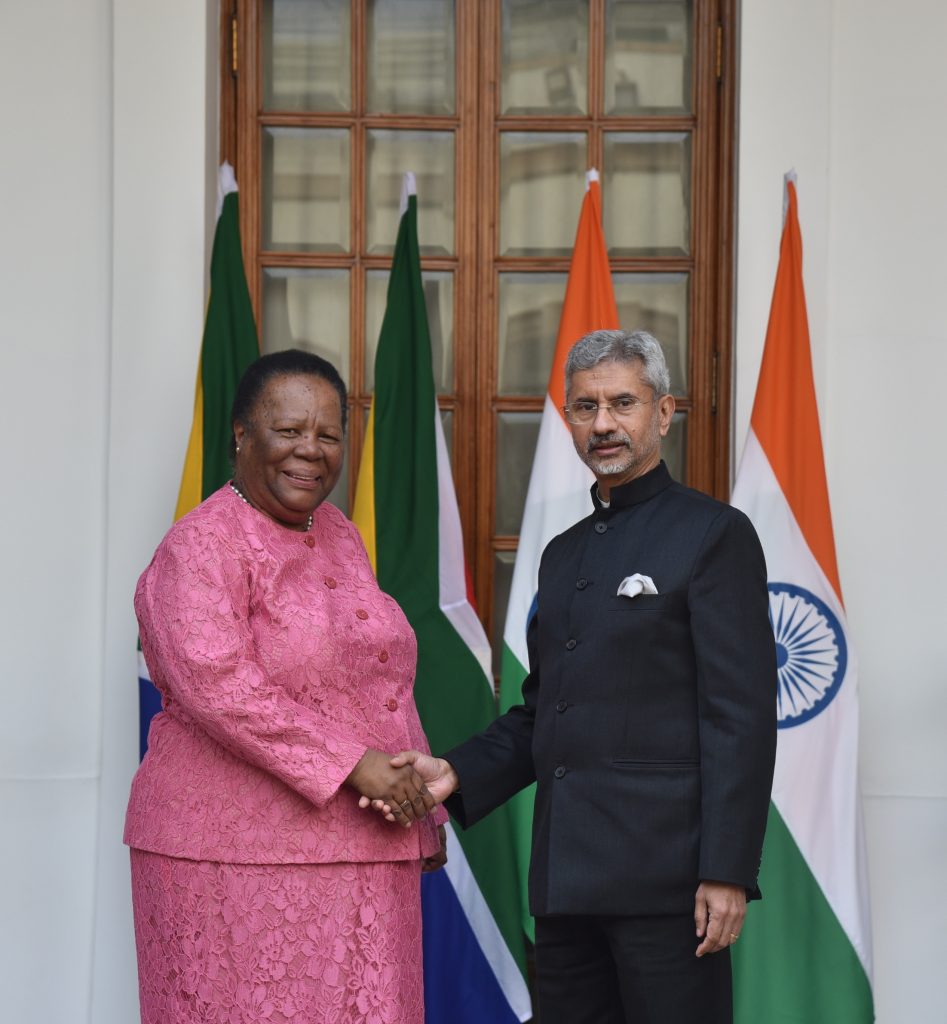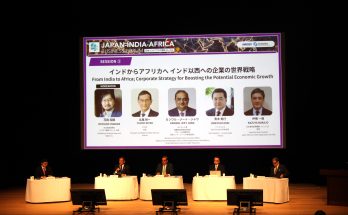Lauding India’s G20 Presidency for advancing interests of the Global South, South Africa’s Foreign Minister Dr G.N.M. Pandor makes a strong case for the African Union’s induction as a member in the G20. In this article exclusively written for the Summit Edition of India and The World, the minister underlines that India, an emerging power, is well-placed to ensure that the core interests of the developing world, including Africa, are promoted in the global arena.
By Dr G.N.M. Pandor
The G20 has become one of the pre-eminent global agenda-setting bodies in international relations outside of formal UN structures. Not only does the G20 serve as the premier economic forum for international cooperation but is an important vehicle to advance Africa’s development priorities. The themes India have chosen for its G20 Presidency this year place the Global South at the centre of development planning.
Accelerating progress on the UN Sustainable Development Goals is a key priority of India’s presidency, and reflects South Africa’s policy goals which are in harmony with this year’s G20 Action Plan. India’s proposals of a Green Development Pact for a sustainable future and its proposed reforms of multilateral institutions for the 21st century reflect our own foreign policy priorities.
Digital Power
India is committed to bridging the digital divide through technology transfer and digital transformation. South Africa believes that If digital architecture is made widely accessible, it can bring about socioeconomic transformation, and the use of digital technologies can become a force multiplier in the fight against poverty.
Harnessing data for development is critical for providing greater access to the internet and improving digital skills. As India’s G20 Sherpa Amitabh Kant has said, “There are 400 million people who do not have a digital identity, 200 million people do not have a bank account, and 133 countries do not even have fast payments. This is a massive opportunity to use technology to transform the world.”
Green Finance
Fast-tracking the delivery of climate finance is a high priority for India’s G20 presidency. It is the perspective of both India and South Africa that developing countries require substantive climate finance to meet their ambitious goals, and developed countries need to lead the mobilisation of resources.
The G20 summit in Bali last year agreed to expedite the delivery of climate finance to developing countries and work on an ambitious New Collective Quantified Goal of climate finance from US$100 billion per year to support developing countries. The Bali Declaration urged developed countries to at least double their collective provision of climate finance for adaptation to developing countries, from 2019 levels, by 2025, in the context of achieving a balance between mitigation and adaptation. There needs to be concrete action from developed countries in terms of climate finance and strengthening the capacity of developing countries to combat climate change. We must also work with G20 countries to scale up the deployment of zero and low-emission power generation, including renewable energy.
Under the Indian Presidency, there is also a focus on enhancing food security, and the need to mobilise the international community to maintain the supply of both fertilisers and grains. Given the non-renewal of the grain deal, whereby Russia was asked to extend the agreement that enabled Ukraine to export grain from its Black Sea ports, this issue is all the more urgent.
India has emphasized the fact that developed countries need to honour their financial commitments to developing countries most in need. Through its laudable support for the Debt Service Suspension Initiative, the G20 attempted to provide relief to developing countries, but the results were below expectations. Not only have developed countries not met their commitments to the developing world, they are trying consistently to shift responsibility to the Global South. We hope that this year’s G20 will bring about more tangible commitments in this regard.
We commend India for its numerous active ministerial meetings that have interrogated all of these issues, and for the consistent contact among the G20 Sherpas.
It’s Time for Africa
South Africa also welcomes the Indian Presidency’s call for the G20 to accept the African Union as a permanent member of the G20. We believe there is a need for Africa to be fully involved in the decision-making processes on global political, economic, financial, security, environmental and health governance.
India, as an emerging global power, is well placed to ensure that the core interests of the developing world, including Africa, are a priority during its presidency. Africa will look to India to ensure that its socio-economic regeneration, as articulated in Agenda 2063, receives the attention it deserves within the G20 this year.
The G20 remains the best forum to pursue the reform of financial and economic multilateral institutions. Making global financial governance institutions more democratic and representative given the ongoing shifts in the world order is a major priority for this year’s G20. The World Bank and IMF need to be more representative to be relevant, and developing countries need greater decision-making power.
Multilateral institutions and international financing institutions, including development banks, need to reform urgently given the rise of emerging economies. A country like Ethiopia – home to more than 100 million people – controls only 0.09% of the votes in the IMF, while the US has a vote share of 16%. This needs to change.
In recent times, the agenda of the G20 has expanded beyond economic and financial issues, and now encompasses issues of peace and security. The G20 is not a substitute for the UN system and should remain an economic development forum and refrain from centering peace and security issues in the forum.
Bridging Divides
The war in Ukraine must not be allowed to divert from the core objectives of the G20. The Global South is concerned at the possibility of the G20 agenda being derailed by the ongoing tensions between Russia and the West. This was the primary challenge that Indonesia faced throughout its presidency and at the Summit itself. There is a need to bridge divides between countries which are polarized over the Ukraine war, so that the G20 can focus on the challenges for which it was created – accelerating Sustainable Development Goals (SDGs), reviving economic growth, and generating the much-needed climate finance.
The model of rotation in the presidency of the G20 allows countries of the South to exercise leadership, and India’s Presidency this year, the Brazilian Presidency in 2024, and South Africa’s Presidency in 2025 will prioritise the global South’s development priorities. The Johannesburg II Declaration adopted at the recent XV BRICS Summit underscored the importance of the G20 in continuing to play the role of the premier multilateral forum in international economic and financial cooperation to jointly seek solutions to global challenges.
(Dr G.N.M. Pandor is the Minister for International Relations and Cooperation in South Africa)
Author Profile
- India Writes Network (www.indiawrites.org) is an emerging think tank and a media-publishing company focused on international affairs & the India Story. Centre for Global India Insights is the research arm of India Writes Network. To subscribe to India and the World, write to editor@indiawrites.org. A venture of TGII Media Private Limited, a leading media, publishing and consultancy company, IWN has carved a niche for balanced and exhaustive reporting and analysis of international affairs. Eminent personalities, politicians, diplomats, authors, strategy gurus and news-makers have contributed to India Writes Network, as also “India and the World,” a magazine focused on global affairs.
Latest entries
 DiplomacyJanuary 5, 2026India walks diplomatic tightrope over US operation in Venezuela
DiplomacyJanuary 5, 2026India walks diplomatic tightrope over US operation in Venezuela India and the WorldNovember 26, 2025G20@20: Africa’s Moment – The Once and Future World Order
India and the WorldNovember 26, 2025G20@20: Africa’s Moment – The Once and Future World Order DiplomacyOctober 4, 2025UNGA Resolution 2758 Must Not Be Distorted, One-China Principle Brooks No Challenge
DiplomacyOctober 4, 2025UNGA Resolution 2758 Must Not Be Distorted, One-China Principle Brooks No Challenge India and the WorldJuly 26, 2025MPs, diplomats laud Operation Sindoor, call for national unity to combat Pakistan-sponsored terror
India and the WorldJuly 26, 2025MPs, diplomats laud Operation Sindoor, call for national unity to combat Pakistan-sponsored terror








